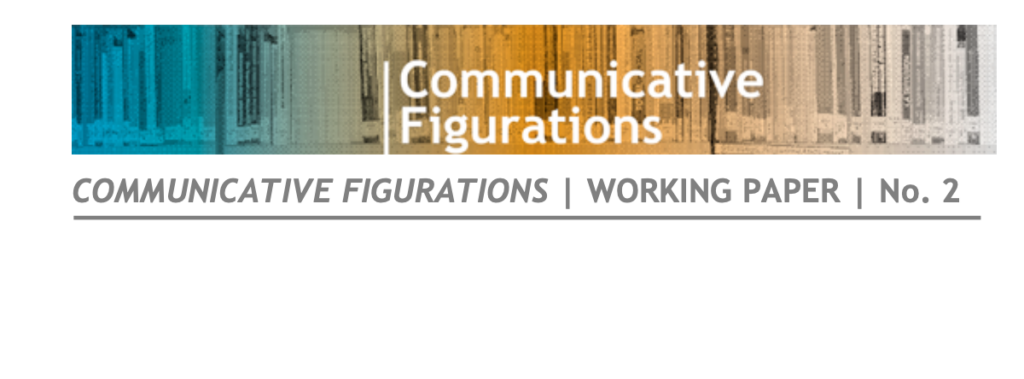
No. 2 - Andreas Hepp & Uwe Hasebrink: Human interaction and communicative figurations. The transformation of mediatized cultures and societies
A main problem of any mediatization research is how to ground it in a practicable empirical approach. When we argue that within an ongoing mediatization process our cultures and societies transform, how can we investigate this in detail? What might be the intermediate concepts by which it becomes possible to research empirically in which way mediatization is related to the change of culture and societies? By posing questions like these, it becomes evident that media as such “do” nothing on their own. They become influential in the way that they “alter” the processes of symbolic interaction or, to be more precise: of communication. We are confronted with complex processes of interweaving in which certain human practices become institutionalized and reified in something that we
call “a medium”, which – itself continuously changing – “alters” our (communicative) construction of cultures and societies. If we want to analyze the mediatization of cultures and societies in such a way, we need an intermediate concept for a corresponding analysis. This chapter outlines the concept of “communicative figurations” as such an approach: This concept makes it possible to develop a practical, transmedial analysis of the changing
communicative construction of mediatized cultures and societies.
To grasp these considerations, we want to argue in three steps. First, we outline a general approach on how to reflect the interrelation between mediatization, interaction and communication. Based on this, we continue by introducing the aforementioned approach on communicative figurations. This is followed by a section which outlines an empirical grounding of communicative figurations. And finally, we conclude with some arguments for a mediatization research that is oriented to questions of interaction and communication.
About the authors
Andreas Hepp
Andreas Hepp is Professor for Media and Communication Studies with the special areas Media Culture and Communication Theory at the ZeMKI, Centre for Media, Communication and Information Research. Hepp graduated 1995 from the University of Trier with an MA-degree in German Studies and Political Science, focusing on media communication. Between 1995 and 1997, he was a research associate in the interdisciplinary research project “Talking about Television. The Everyday Appropriation of TV“ at the University of Trier (funded by the Deutsche Forschungsgemeinschaft, DFG). In 1997, he finished his doctoral thesis on everyday appropriation of television, combining various perspectives of Cultural Studies with sociological conversation analysis. After having done
some post-doctoral research at the University of Trier, Andreas Hepp was a lecturer at the Interfaculty Institute for Applied Cultural Studies at the University of Karlsruhe (TH) in 1999. Between 1999 and 2003, he worked as a research associate at first, and later-on as an academic assistant (wissenschaftlicher Assistent) at the Institute for Media and Communication Studies at the Technical University of Ilmenau. During that time, he was also a research fellow at the Nottingham Trent University, UK, and a visiting researcher at the University of Sunderland, UK. In 2004, he finished his habilitation thesis on media cultures and globalisation. In 2003 and 2004, he was a deputy professor for media sociology and media psychology at the University of Muenster. From 2005 to 2010 he was professor for communications at the faculty for cultural studies, University of Bremen.
Uwe Hasebrink
Uwe Hasebrink, after studying Psychology and German Philology in Hamburg, he subsequently worked for three years at the Institute for Social Psychology at the University of Hamburg. He joined the Hans Bredow Institute in 1986 as a researcher; from 1988 he also acted as the executive manager. In 1998, he was elected to the Institute’s directorate. In 1999, he was Acting Professor of Communications at the College of Music and Theatre in Hanover. In spring 2001, he received a chair in “Empirical Communications Studies” from the University of Hamburg and the Hans Bredow Institute jointly. Since 2009 he is a member of the board of directors of the Research Center for Media and Communication (RCMC), which brings together university and non-university media and communication research in Hamburg, and at the same time one of the spokespersons of the Graduate School Media and Communication, which is being supported within the context of the Hamburg initiative of excellence. Alongside this, he was spokesperson for the specialist group on reception research in the DGPuK from 1998 to 2003, co-publisher of the series “Rezeptionsforschung” (reception research) from 2003 to 2007, and a member of the Management Committee of the International Radio Research Network (IREN) from 2004-2006. He has been a member of the Executive Board of the European Communication Research and Education Association (ECREA) since 2004 and has held a curatorship at the Academy for Journalism and Communications in Hamburg since 2001. Since 2009 he has been a member of the international board of the “Journal of Children and Media”. His research emphases at the Institute are in the areas of media use and media contents, as well as media politics; in recent years these included primarily: patterns of individual use and media repertoires, the convergence of the media from the user’s perspective, consequences of online media for classical media, media use with children and young people, forms of user interest vis-à-vis the media, as well as European media and European audiences.

